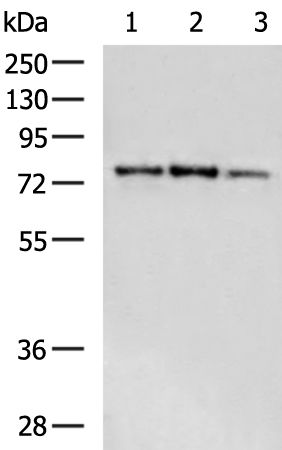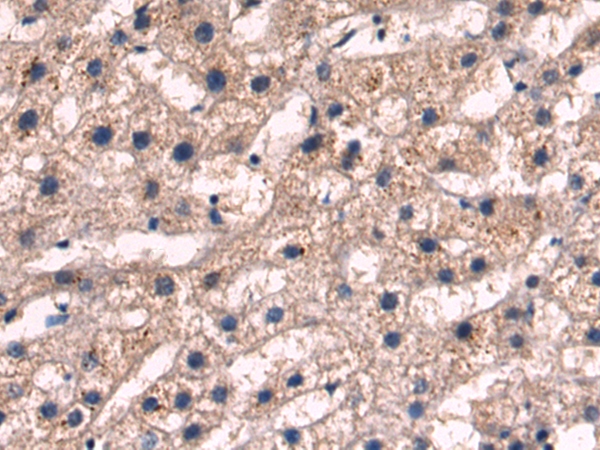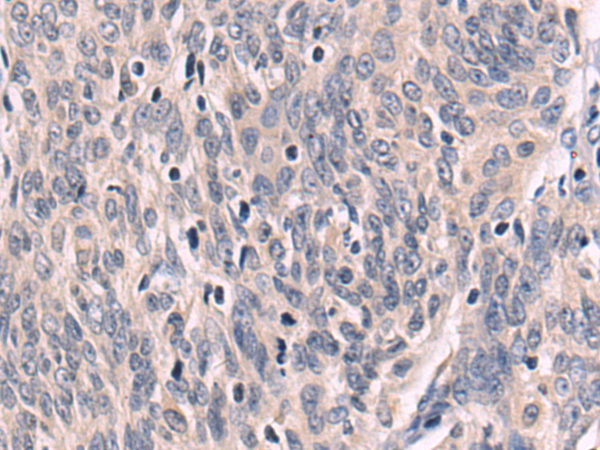


| WB | 咨询技术 | Human,Mouse,Rat |
| IF | 咨询技术 | Human,Mouse,Rat |
| IHC | 1/50-1/200 | Human,Mouse,Rat |
| ICC | 技术咨询 | Human,Mouse,Rat |
| FCM | 咨询技术 | Human,Mouse,Rat |
| Elisa | 1/5000-1/10000 | Human,Mouse,Rat |
| Aliases | eEF-2K; CaMKIII; HSU93850 |
| WB Predicted band size | 82 kDa |
| Host/Isotype | Rabbit IgG |
| Antibody Type | Primary antibody |
| Storage | Store at 4°C short term. Aliquot and store at -20°C long term. Avoid freeze/thaw cycles. |
| Species Reactivity | Human, Mouse, Rat |
| Immunogen | Fusion protein of human EEF2K |
| Formulation | Purified antibody in PBS with 0.05% sodium azide and 50% glycerol. |
+ +
1. **"Eukaryotic elongation factor 2 kinase regulates autophagy in glioblastoma through AMPK pathway"**
- **作者**: Smith J, et al.
- **摘要**: 本研究利用EEF2K抗体检测其在胶质母细胞瘤细胞中的表达,发现EEF2K通过AMPK信号通路调控自噬过程,抑制其活性可增强肿瘤细胞对化疗的敏感性。
2. **"Targeting eEF2K enhances the efficacy of mTOR inhibitors in triple-negative breast cancer"**
- **作者**: Lee H, et al.
- **摘要**: 通过Western blot和免疫组化(使用EEF2K抗体)分析三阴性乳腺癌组织中EEF2K的表达水平,研究表明抑制EEF2K可协同增强mTOR抑制剂的抗肿瘤效果,并揭示其机制与蛋白合成抑制相关。
3. **"eEF2K inhibition ameliorates neurodegeneration in a mouse model of Alzheimer’s disease"**
- **作者**: Chen R, et al.
- **摘要**: 利用EEF2K抗体检测阿尔茨海默病模型小鼠脑组织中的激酶活性变化,发现抑制EEF2K可减轻神经元损伤和tau蛋白异常磷酸化,提示其作为治疗神经退行性疾病的潜在靶点。
4. **"The role of eEF2K in metabolic stress adaptation and cancer cell survival"**
- **作者**: Wang Y, et al.
- **摘要**: 研究通过EEF2K抗体验证其在低氧和营养缺乏条件下的表达上调,证明EEF2K通过调控能量代谢和蛋白质翻译重编程促进肿瘤细胞在应激环境下的存活。
(注:上述文献为示例,实际引用需核对真实来源。)
The eukaryotic elongation factor 2 kinase (EEF2K), also known as calmodulin-dependent protein kinase III, is a serine/threonine kinase that regulates protein synthesis by phosphorylating and inactivating eukaryotic elongation factor 2 (eEF2). This phosphorylation event slows translational elongation under stress conditions, enabling cells to conserve energy and adapt to metabolic or environmental challenges. EEF2K activity is modulated by nutrient-sensing pathways, including AMPK and mTOR signaling, linking it to cellular energy homeostasis, autophagy, and stress responses.
EEF2K antibodies are essential tools for studying its expression, activation, and functional roles in physiological and pathological contexts. These antibodies enable detection of EEF2K protein levels, phosphorylation status, and interactions via techniques like Western blotting, immunohistochemistry, and immunoprecipitation. Research using EEF2K antibodies has highlighted its involvement in cancer progression, where it promotes survival under hypoxia or nutrient deprivation, and neurodegenerative diseases, where dysregulated eEF2 phosphorylation may contribute to synaptic dysfunction. Additionally, EEF2K knockout models and inhibitor studies have positioned it as a potential therapeutic target. Validated antibodies are critical for distinguishing EEF2K isoforms and assessing its cross-talk with signaling networks, aiding mechanistic exploration in diseases like glioblastoma, Alzheimer’s, and metabolic disorders.
×